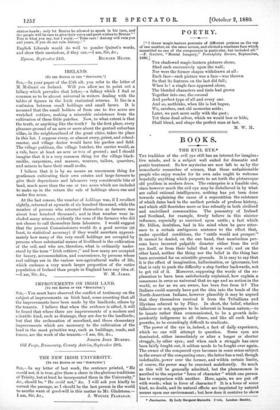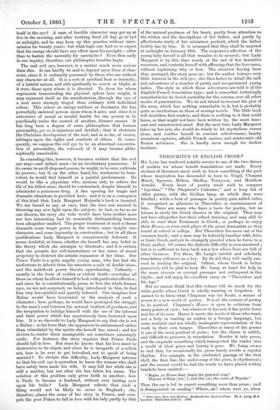BOOKS.
THE EVIL EYE.*
THE tradition of the evil *eye still has an interest for imagina- tive minds, and is a subject well suited for dramatic and poetic treatment. So few mysteries are now left to us by the iconoclastic researches of science, that those unfashionable people who enjoy wonder for its own sake ought to welcome hopefully anything which purports to set forth the picturesque old problem in modern dress. The enterprise is a feasible one,. since however much the evil eye may be disbelieved in by what are called rational intelligences, nothing has yet been done towards explaining the cause of a superstition the existence- of which dates back to the earliest periods of profane history, and which still flourishes more or less robustly in both civilised and uncivilised communities. The peasantry of Ireland and Scotland, for example, firmly believe in this sinister influence, especially as exercised upon cattle ; a fact which, Mr. Dillon, doubtless, had in his mind when he gave utter- ance to a certain ambiguous sentence to the effect that, under specified conditions, the "cattle would not prosper.' It cannot be denied, on the one hand, that numberless per- sons have incurred palpable disaster either from the evil eye itself, or from their belief that it was evil; and on the other hand, neither the thing nor the belief in the thing has. been accounted for on scientific grounds. It is easy to say that it is the effect of imagination, hallucination, or ignorance, but that is only to push the difficulty a step further backwards, not to get rid, of it. Moreover, supposing the words of the ex- planation to have been satisfactorily explained, how explain al consensus in error so universal that no age and no nation in the world, so far as we are aware, has been free from it P The Italians could scarcely have put the idea into the heads of the North-American Indians, however plausibly it may be argued: that they themselves received it from the Triballians and Illyrians referred to by Pliny. In short, the belief, whether fallacious or not, appears to be inherent in human nature,—to be innate rather than communicated, to be a growth inde- pendently indigenous to all climes, and like all such hardy growths, to be exceedingly difficult to eradicate.
The power of the eye is, indeed, a fact of daily experience,. which no one will attempt to question. Some eyes are dominated, either immediately or after a longer or shorter struggle, by other eyes ; and when such a struggle has once been fairly fought out, it seldom needs to be fought over again.. The owner of the conquered eyes becomes in some sense subject to the owner of the conquering ones ; the latter has a real, though indefinable, power over the former, and within certain limits, of coarse, the power may be exercised maleficently. So much as this will be generally admitted, but the phenomenon is, ascribed to the superior "force of character" which one person has in comparison with another. Here, again, we are put off with words; what is force of character ? It is a force of some kind, no doubt, and its natural effects are imprinted by natural, means upon our environment ; but how does it contrive to shova * Fascinatki. By Lady Margaret Majendie. 2 vols. London: Bentley.
itself in the eye ? A man of forcible character may get up at five in the morning, and after working hard all day, go to bed at midnight, and he may keep up this practice without inter- mission for twenty years ; but what logic can lead us to expect that his energy should have any effect upon his eyesight,—other than to hasten the necessity for spectacles ? Even thus early in our inquiry, therefore, our philosophic troubles begin.
The real evil eye, however, is a matter much more serious than this. It can hardly be said to depend upon force of char- acter, since it is ordinarily possessed by those who are without any character at all. It is a sort of spiritual heat or intensity, of a baleful nature, and able spiritually to scorch or blight, as it were, those upon whom it is directed. To those for whom arguments transcending the physical sphere have weight, it may represent itself as the manifestation, through the eye, of a soul more strongly tinged than ordinary with individual colour. This colour or energy subdues or fascinates the less powerfully endowed person upon whom it acts ; and since it is subversive of moral or mental health for one person to be psychically under the control of another, disaster ensues. It has long been a dogma of some philosophers that human personality, per se, is injurious and devilish ; that it obstructs the Christian development of the soul, and in so far, of course, infringes upon the rights and comforts of others. If, conse- quently, we suppose the evil eye to be an abnormal concentra- tion of personality, the rationale of it may become philo- sophically conceivable.
In conceding this, however, it becomes evident that the evil eye may—and indeed must—be an involuntary possession. If its owner be an ill-disposed person, he might, to be sure, cultivate its powers ; but if, on the other hand, his tendencies be bene- volent, he would find himself in a painful predicament. He would be like a physician who, anxious only to relieve the ills of his fellow-man, should be constrained, despite himself, to administer a poisonous drug. A fine opening for tragic and dramatic situations is provided here; and it is on a conception of this kind that Lady Margaret Majendie's book is founded. We are bound to say, at once, that she does not succeed in throwing any new light upon the subject; in fact, so far as we can discern, the story she tells would have been neither more nor less interesting had its nominally distinguishing feature been altogether omitted. The proper treatment of such a theme demands some tragic power in the writer, some insight into character, and some ingenuity in construction ; but in all these qualifications Lady Margaret is conspicuously deficient. It seems doubtful, at times, whether she herself has any belief in the theory which she attempts to illustrate ; and it is certain that she permits her soft-heartedness or her sense of moral propriety to obstruct the artistic expansion of her ideas. Her Prince Paolo is a quite angelic young man,. who has had the misfortune to inherit from his ancestors a pair of double irises, and the maleficent power thereto appertaining. Calamity— usually in the form of sudden or violent death—overtakes all those on whom he allows himself to look with particular affection and since he is constitutionally prone to love the whole human race, we are not surprised, on being introduced to him, to find him very low-spirited and queerly behaved. One imagines how Balza,c would have luxuriated in the analysis of such a character ; how, perhaps, he would have portrayed the struggle in the man's soul between his natural instinct of goodness, and the temptation to indulge himself with the use of the infernal and fatal power which has mysteriously been bestowed upon him. It is no discredit to Lady Margaret to say that she is not a Balzac ; so far from that, she appears to be embarrassed rather than stimulated by the spirits she herself has raised ; and her devices to render them manageable are sometimes amusingly crude. For instance, the story requires that Prince Paolo should fall in love. But since he knows that his love must be destructive to its object, and since he is incapable of a selfish act, how is he ever to get betrothed, not to speak of being married ? To obviate this difficulty, Lady Margaret informs us that his evil eye is powerless to harm the woman who shall have safely been made his wife. It may kill her while she is still a maiden, but not after she has taken his name, The solution of this problem only gives birth to another; how is Paolo to become a husband, without ever Casting eves upon his bride ? Lady Margaret reflects that such a thing would not be likely to occur in England ; she, therefore, places the scene of her story in France, and com- pels the poor Prince to fall in love with his lady partly by dint of the natural goodness of his heart, partly from attention to the wishes and the descriptions of her father, and partly by affectionate study of her miniature portrait, which the father luckily has by him. It is arranged that they shall be married at midnight on January 18th. The responsive affection of the young lady herself is all that remains to be secured ; but Lady Margaret is by this time nearly at the end of her inventive resources, and contents herself with affirming that the love came, without explaining why or how. The situation having been thus arranged, the story goes on ; but the author betrays very little interest in the evil eye; she likes better to detail the talk and adventures of a number of pretty and inexperienced young ladies. The style in which these adventures are told is of the English-French translation type ; and is somewhat irritatingly remarkable for its lavish partiality for the comma, over all other modes of punctuation. We do not intend to recount the plot of the story, which has nothing remarkable in it, but is probably quite as meritorious as those of average novels. The little book will doubtless find readers, and there is nothing in it that could harm, or that might not have been written by, the most inno- cent and uninstructed mind. But the next time Lady Margaret takes up her pen, she would do wisely to let mysterious curses alone, and confine herself to convent school-rooms, hearty steamboat captains, affable French squires, and aristocratic old Breton noblemen. She is hardly stern enough for darker business.



































 Previous page
Previous page